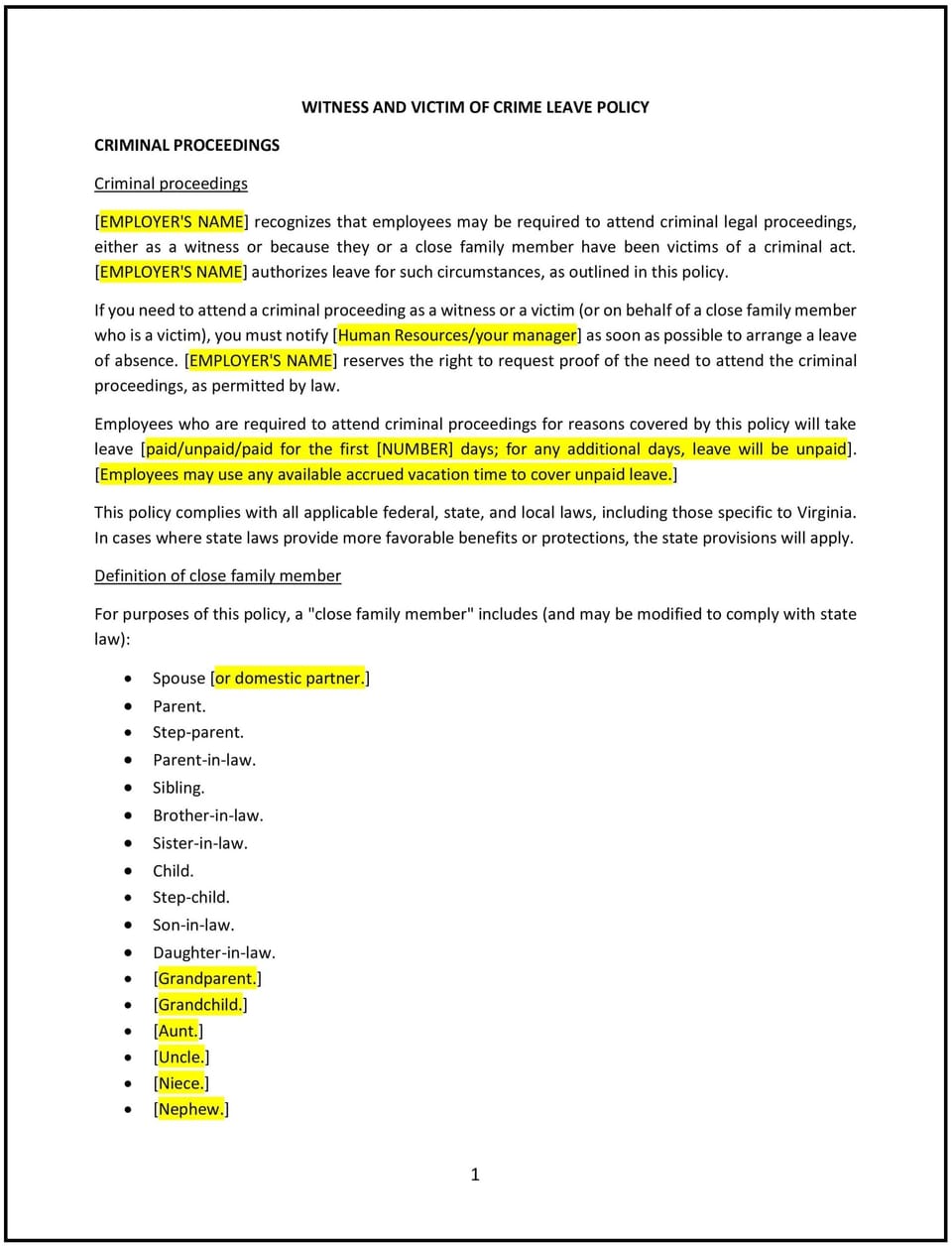Witness and victim of crime leave policy (Virginia): Free template

This witness and victim of crime leave policy is designed to help Virginia businesses provide support to employees who are victims or witnesses of a crime. The policy outlines the rights of employees to take leave for attending legal proceedings, cooperating with law enforcement, or addressing personal matters resulting from their involvement in a crime.
By implementing this policy, businesses can show support for employees facing difficult situations, ensuring that their legal and emotional needs are met while minimizing disruptions to their work.
How to use this witness and victim of crime leave policy (Virginia)
- Define eligibility: The policy should specify which employees are eligible for witness or victim of crime leave. Typically, this includes employees who are victims of crimes, witnesses to crimes, or family members of victims.
- Outline types of leave: The policy should clarify the type of leave provided, including whether it is paid or unpaid, how much time off is available, and whether it is continuous or intermittent.
- Specify the reasons for leave: Clearly state that leave can be used to attend court hearings, cooperate with law enforcement investigations, or deal with any legal or personal matters arising from the crime.
- Require documentation: The policy should explain that employees may need to provide documentation, such as court notices or police reports, to verify the need for leave.
- Address job protection: Ensure that employees who take leave are entitled to return to their position without penalty or loss of benefits, as long as they comply with the policy's requirements.
- Provide guidance for requesting leave: Specify how employees should request crime leave, including the notice period and the format in which the request should be made (e.g., written notice, verbal request).
- Review and update regularly: Periodically review and update the policy to ensure it remains compliant with Virginia state laws and reflects any changes in business operations or legal requirements.
Benefits of using this witness and victim of crime leave policy (Virginia)
This policy offers several benefits for Virginia businesses:
- Supports employees during difficult times: By providing leave to employees who are victims or witnesses of crimes, businesses demonstrate compassion and understanding during challenging personal situations.
- Promotes legal compliance: This policy helps businesses comply with Virginia state laws regarding crime victim leave and employee rights, reducing potential legal liabilities.
- Improves employee retention: Offering witness and victim of crime leave can improve employee loyalty and morale, helping businesses retain employees during tough times.
- Enhances workplace trust: A clear and supportive leave policy fosters trust between the business and its employees, showing that the company prioritizes employee well-being and fairness.
- Reduces absenteeism: With a clear leave policy, employees are more likely to feel supported and less likely to use unauthorized leave or experience stress about their responsibilities during a difficult time.
Tips for using this witness and victim of crime leave policy (Virginia)
- Communicate the policy clearly: Ensure that all employees are aware of the policy and understand their rights to take crime-related leave. Include it in the employee handbook and discuss it during onboarding.
- Keep the process straightforward: Make the process for requesting leave simple and clear, so employees can easily follow the steps to take time off when needed.
- Be flexible where possible: Consider allowing employees to take time off in smaller increments or work out flexible arrangements when possible to accommodate their legal proceedings or personal matters.
- Respect confidentiality: Ensure that all requests for leave are handled with confidentiality and respect for the employee’s privacy.
- Review and update regularly: Periodically review the policy to ensure it remains compliant with Virginia state laws, federal regulations, and changes in business operations or legal procedures.
Q: Who is eligible for witness and victim of crime leave?
A: Employees who are victims of crimes, witnesses to crimes, or family members of victims may be eligible for leave under this policy. Eligibility criteria may vary depending on the specific circumstances.
Q: How much time off is provided under this policy?
A: The policy should specify the amount of time off allowed, whether it is paid or unpaid, and whether it is provided in a lump sum or on an intermittent basis as needed for court hearings or law enforcement activities.
Q: What documentation is required to take leave?
A: Employees may be required to provide documentation, such as court orders, police reports, or subpoenas, to verify the need for leave. The policy should specify what is acceptable.
Q: Is the leave paid or unpaid?
A: The policy should clarify whether leave is paid or unpaid. Some businesses may offer paid leave for crime victims, while others may offer unpaid leave or allow employees to use other forms of paid time off.
Q: How should employees request crime leave?
A: Employees should follow the company’s specified procedure for requesting leave, which may include notifying their supervisor or HR department and providing necessary documentation in advance of their absence.
This article contains general legal information and does not contain legal advice. Cobrief is not a law firm or a substitute for an attorney or law firm. The law is complex and changes often. For legal advice, please ask a lawyer.


